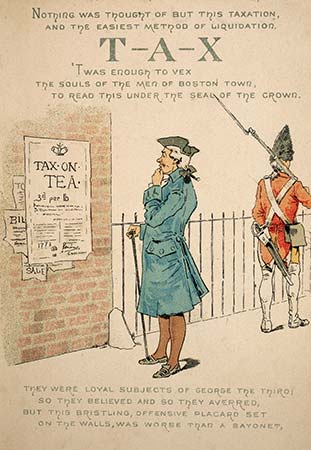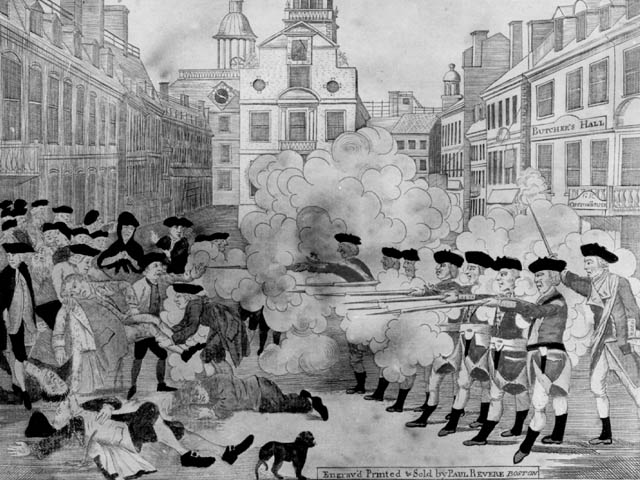The Townshend Acts were a series of acts that the British Parliament passed in 1767, with all but one passed that year. There were five acts in all: the Revenue Act of 1767, the Indemnity Act, the Commissioners of Customs Act, the Vice Admiralty Court Act of 1768, and the New York Restraining act. In 1770, the Boston Massacre would take place because of them.
The British Empire was badly in debt when the Seven Years’ War ended in 1763. So, Parliament decided to tax the colonies for the sole purpose of making money and getting themselves out of debt. When the Sugar Act of 1764 was passed for this purpose, Britain faced many angry colonists arguing that taxing them this way was unconstitutional. Americans were also angry that they were not represented in Parliament after passing down the “virtual representation” Britain had offered. The 1765 Stamp Act was soon passed, and the argument of not being represented in Parliament only became more of an argument. A year later, Parliament repealed the Stamp Act and passed the Declaratory Act. With this new act in place, Parliament had as much control over the colonies as they did in Britain.
On June 29, 1767, the first of the five Townshend Acts was passed: the Revenue Act. This placed duties, or taxes, in the colonies on paper, paint, lead, glass and tea, all items that had to be imported from Britain. Charles Townshend, Chancellor of the Exchequer, first proposed the idea of taxing the colonists with indirect, or external, taxes and items that were not made in America. Colonists still argued that external and internal taxes were both unconstitutional for the sheer purpose of revenue.
At the same time, Parliament also passed the Indemnity Act of 1767. All tea imported to America by the British East India Company would no longer be taxed. Parliament put this act in place so that their tea would compete with tea the Dutch smuggled in. Writs of Assistance, or search warrants, were also given to British customs officials so they had the ability to search for smuggled goods in houses and businesses.
Originally, the taxes were mainly put in place so Britain could continue to fund and maintain the army in America. Instead the money was used to pay governors and judges in the colonies. Parliament started paying them instead of the colonial assemblies so the colonies would no longer have the “power of the purse”. Townshend also said that over time the money would keep growing and they would get more revenue from the colonies in hopes they would be able to eventually pay for themselves.
The American Board of Customs Commissioners was established with the passing of the Commissioners of Customs Act of 1767. The British Board of Customs was having trouble enforcing trade regulations in the colonies all the way from Britain, so they created one in America. Headquartered in Boston, five commissioners were appointed by the British government to be on the board. With the new board, Colonists were even more angry with Britain and the laws Parliament was passing. According to many historians, the board was almost always in favor of the British and was considered corrupt.
In 1768, the Vice Admiralty Court Act was passed through Parliament. This was the only act that Townshend did not take apart of, though it is still considered one of the Townshend Acts. Previously, there had been one vice admiralty court in America, and it was located in Nova Scotia. The colonies needed more than one court though, so four district courts were established. The court in Halifax remained, but ones in Boston, Philadelphia, and Charleston were added. As a matter of fact, the main reason for these courts was to help out the customs enforcers without a jury present.
When the New York Provincial Assembly refused to follow the Quartering Act in 1765, Parliament had to figure out what to do. The New York Restraining Act was passed so that the New York Provincial Assembly would be suspended until they followed the Quartering Act. But, once it had been passed, New York had come up with the money of the costs for the Quartering Act, so it never went into effect. The New York Assembly also passed their own act saying that it was unconstitutional for Parliament to suspend an elected legislature.
Parliament, of course, did not receive a good reaction from colonists with the passing of the acts. Appearing for the first time in December of 1767, John Dickinson wrote a series of twelve essays entitled “Letters from a Farmer in Pennsylvania”, resulting in the Massachusetts house of Representatives campaigned against the acts by demanding King George repeal the Revenue Act and urging other colonial assemblies to join them. Both Virginia and Pennsylvania sent Parliament petitions, but Parliament did not even consider either.
Merchants would often have boycotts organized and Boston was the first one to really start a boycott. They organized an agreement that merchants would stop receiving specific goods from Britain. The Virginia house of Burgesses passed their own act stating that Parliament could not tax them without their consent before hand. When Governor Lord Botetourt had the assembly dissolved, many people began to meet at Raleigh Tavern to create their own boycott they called the “Association”. By 1771, the Boycott ended after many merchants continued to import British goods.
Of all the cities in the colonies, the most officers were located in Boston enforcing the new acts. Bostonians were furious. It was getting so out of hand that the Customs Board had to personally ask Britain sent troops to enforce the acts. The unrest in Boston did not cease, in fact, it continually got worse and worse. British troops first arrived on October 1, 1768, causing even more riots and unrest. Then, on March 5, 1770 the Boston Massacre took place after colonists had been rioting and taunting officers.
On the same day the massacre took place, the new British Prime Minister, Lord North, had the Townshend Revenue Act partially repealed. May Parliament members wanted the acts to be fully repealed to stop the unrest in the colonies, but North disagreed. On April 12, 1770, The Repeal Act got Royal Assent. Then, the 1773 tea Act was passed which led to the Boston Tea Party. If it weren’t for the Townshend Acts, the colonies may have never won over their independence until much later.




